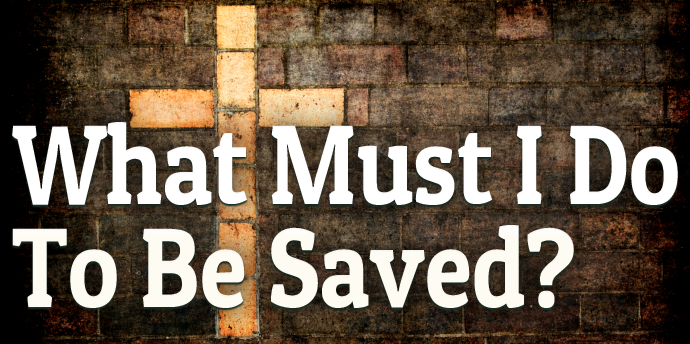Catechism Question 32

How may we be saved from this terrible fate?
We are saved only by repenting of our sin and having true faith in Jesus Christ and His substitutionary atoning death on the cross.
Focus and Purpose of this Question
In this question, we show that the only way we may escape the righteous wrath of God against our sin is by repenting of our sin and having true faith in the person and work of Jesus Christ. The definition of repentance, true faith, and all of the benefits of being saved will be explored in the upcoming questions.
It is important to note the word ‘only.’ The important understanding of faith alone will be explored in the upcoming questions, but for now, it is important to note that salvation comes from faith alone in Christ alone. Just as we may not seek salvation in anyone other than Christ, we also may not seek salvation in Christ by any means other than true faith in Him.
Finally, it is critical to note that our faith is in the substitutionary atoning work of Jesus – not just His example. We are saved because Christ died in our place (substitution), bearing the righteous wrath of God against sin (atonement). Any other understanding of the work of Jesus Christ is insufficient and does not lead to salvation. If Christ was merely our example or a great teacher, we are still lost in our sin. True faith is in the Person of Jesus (His full and true Deity and humanity) and His work on our behalf (His perfect obedience, and His substitutionary and atoning death).
Additional Questions:
How may we be saved from going to hell?
How are we saved?
How do we receive the benefits of Jesus’ redeeming work for us?
Scripture References:
Mark 1:14–15
After John was put in prison, Jesus went into Galilee, proclaiming the good news of God. 15 “The time has come,” he said. “The kingdom of God is near. Repent and believe the good news!”
Luke 24:46–47
He told them, “This is what is written: The Christ will suffer and rise from the dead on the third day, 47 and repentance and forgiveness of sins will be preached in his name to all nations, beginning at Jerusalem.”
Acts 5:31
God exalted him to his own right hand as Prince and Savior that he might give repentance and forgiveness of sins to Israel.
Acts 20:21
I have declared to both Jews and Greeks that they must turn to God in repentance and have faith in our Lord Jesus.
Romans 10:9–10
That if you confess with your mouth, “Jesus is Lord,” and believe in your heart that God raised him from the dead, you will be saved. 10 For it is with your heart that you believe and are justified, and it is with your mouth that you confess and are saved.
John 20:30–31
Jesus did many other miraculous signs in the presence of his disciples, which are not recorded in this book. 31 But these are written that you may believe that Jesus is the Christ, the Son of God, and that by believing you may have life in his name.
Ephesians 2:8–9
For it is by grace you have been saved, through faith — and this not from yourselves, it is the gift of God — 9 not by works, so that no one can boast.
Questions for Further Discussion:
Why are both repentance and faith required for us to receive Christ’s redeeming work? Is it possible to have genuine faith without truly repenting of our sin?
Why is it important to say that we are saved ‘only’ by repentance and faith in Christ? What other things are we tempted to add to the work of Christ?
Why is it important to say that our faith must be in the Person and work of Christ? What if someone says they believe in Jesus, but do not believe that He had to die in their place for a loving God to receive them?
Why must we believe in the substitutionary, atoning death of Christ? Why can’t we just believe that His life was a great example for us and that His teachings are the guide by which we should live?
Additional Information:
This question is based on question 60 of the Heidelberg Catechism, question 85 of the Westminster Shorter Catechism, and question 29 of the New City Catechism. Any resources you find on the Heidelberg, Westminster Shorter or New City Catechisms will have a good discussion on this question.
For additional information, see the teachings “What It Means To Be A Disciple” (July 13, 2008); “Justification By Faith Alone” (February 6, 2005); “Paul, Peter, and Justification By Faith Alone” (January 2, 2005); “Second Chance” (September 4, 2011).
Suggested Worship Song:
Come Ye Sinners, Poor and Needy (by Joseph Hart, 1759)
Come, ye sinners, poor and wretched,
Weak and wounded, sick and sore;
Jesus, ready, stands to save you,
Full of pity, joined with power.
He is able, He is able;
He is willing; doubt no more.
Come ye needy, come, and welcome,
God’s free bounty glorify;
True belief and true repentance,
Every grace that brings you nigh.
Without money, without money
Come to Jesus Christ and buy.
Come, ye weary, heavy laden,
Bruised and broken by the fall;
If you tarry ’til you’re better,
You will never come at all.
Not the righteous, not the righteous;
Sinners Jesus came to call.
Let not conscience make you linger,
Nor of fitness fondly dream;
All the fitness He requireth
Is to feel your need of Him.
This He gives you, this He gives you,
‘Tis the Spirit’s rising beam.
Lo! The Incarnate God, ascended;
Pleads the merit of His blood.
Venture on Him; venture wholly,
Let no other trust intrude.
None but Jesus, none but Jesus
Can do helpless sinners good
